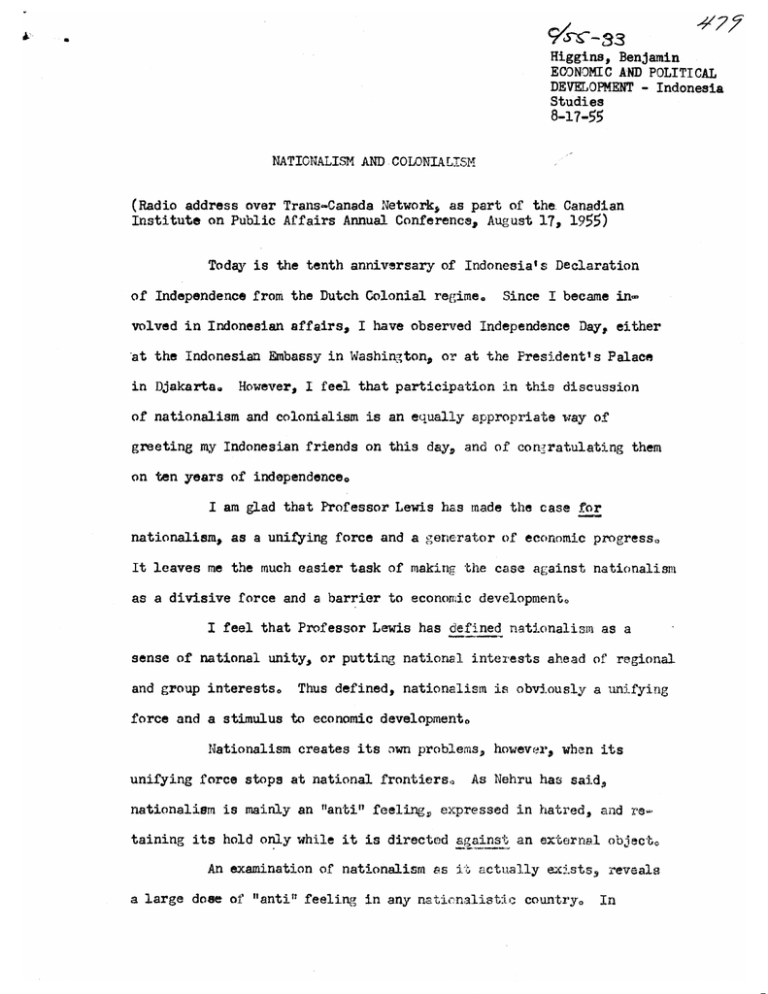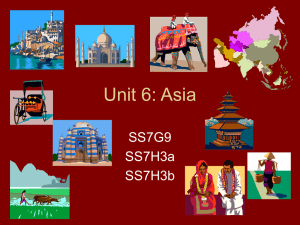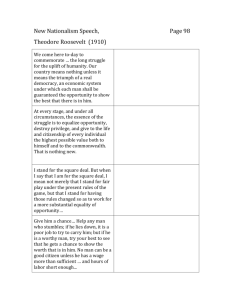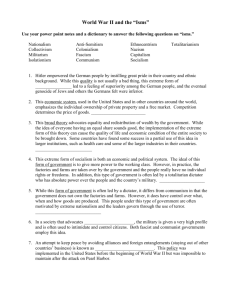8-17-55 1955)
advertisement

Higgins, Benjamin ECONOMIC AND POLITICAL DEVELOPMENT - Indonesia Studies 8-17-55 NATIONALISM AND COLONIALISM (Radio address over Trans-Canada Network, as part of the Canadian Institute on Public Affairs Annual Conference, August 17, 1955) Today is the tenth anniversary of Indonesia's Declaration of Independence from the Dutch Colonial regime. Since I became in- volved in Indonesian affairs, I have observed Independence Day, either at the Indonesian Embassy in Washington, or at the President's Palace in Djakarta. However, I feel that participation in this discussion of nationalism and colonialism is an equally appropriate way of greeting my Indonesian friends on this day, and of congratulating them on ten years of independence. I am glad that Professor Lewis has made the case for nationalism, as a unifying force and a generator of economic progress, It leaves me the much easier task of making the case against nationalism as a divisive force and a barrier to economic developmento I feel that Professor Lewis has defined nationalism as a sense of national unity, or putting national interests ahead of regional and group interests. Thus defined, nationalism is obviously a unifying force and a stimulus to economic development. Nationalism creates its own problems, however, when its unifying force stops at national frontierso As Nehru has said, nationalism is mainly an "anti" feeling, expressed in hatred, and retaining its hold only while it is directed against an external object. An examination of nationalism as it actually exists, reveals a large dose of "anti" feeling in any nationalistic countryo In -2Indonesia, where nationalism coincides with "neutralism", it is "lanti-imperialist", "anti-capit alist", "anti-western", and "anti-communist" all at the same time. "anti-Amrerican", Lib;en nationalism, is anti-semitic, anti-Italian, and seems increasingly anti-Western. French Canadian nationalism is anti-American, anti-English Canadian, and only a lesser degree anti-British. French Canadian nationalism may soon be swamped in a mounting wave of Canadian nationalism, at once antiAmerican and anti-British, which seems to be replacing our old "national inferiority complex", which was perhaps a kind of perverse nationalism itself. This kind of nationalism is clearly a divisive force in international relations. Even more serious, in my opinion, is the way in which such nationalism impedes economic development. Few indeed of the ex- colonial countries are in a position to raise their standards of living without some capital and technical assistance from abroad. But where nationalism is translated into fear and suspicion of all major foreign powers, the required assistance is unlikely to be sought or obtained. in more subtle ways, Moreover, nationalism retards economic development A good economic development plan cannot be pre- pared until a nation has decided what its pattern of economic growth should be, and with what countries it expects to have commercial and political relationships. Indonesian fear and suspicion of foreigners runs so deep that the government has been reluctant even to recruit the foreign experts needed to determine the quantity and quality of resources on which a development plan should be based0 dangers. Many Indonesians recognize these The leaders of the Masjumi Party-the largest single party in Indonesia, just returned to power-have deplored "misdirected nationalism". The Masjumi program states that a chauvinistic policy of leaning on indigenous Indonesians, who are economically still weak, should be replaced by a policy of applying all the labour and capital available, irrespective of origin, and of exploiting ell possibilities of foreign economic aid. As for colonialism, on the other hand, I would put the case against it even more strongly than Professor Lewis. It is just plain wrong to use superior physical force to continue any colonial regime, where a mass movement for independence is under way. There is no excuse for continuing French colonialism in North Africa, nor, I suspect, for postponing the cession of complete independence to Malaya and Singapore. Ending colonialism is necessary, not only for peace in colonial areas, but for friendly relations between the West and the newly independent countries. Someone may ask,"What if the people are not ready for self:overnment?" "What if the anti-colonial drive springs from a small group of rebels or a large, though minority, group of commiunist?" "What if the country is torn by inner conflicts?" These are outworn arguments. There are ways of meeting such situations, while transferring sovereignty to the people concerned. The job done by the colonial powers in the past can now be done by the United Nations and by other foreign aid programs. Few countries could have been less ready for self-government than Libya in 1952; but with a U.N. mission to arrange the transfer of sovereignty, with a team to prepare a development plan, and with continuing guidance and financial assistance from the British, French and American governments, Libya has embarked on her independence with considerable success. A similar approach might work elsewhere. I am not unaware of the value of colonialism as a constructive force. I remember my impression of French colonialism in the Fezzan. The villages where the French colonial army had done a job were clearly at a higher level of civilization, in both material and aesthetic terms, than the others. On unschduled visits to these villages, I was impressed by the warmth with which the villagers greeted the French Colonial Army officers who accompanied us. I was forced to admit, somewhat reluctantly, that the official French colonial policy, of raising the level of colonial people to the point where they are eligible for French citizenship, was their policy in practiceo But the French colonial policy is based on one fatally fallacious assumption--that the people in the French colonies want to be French citizens. They want nothing of the kind; the' want their independence, and they should have it. goodwill--and there's still If the change-over is made in a spirit of time to do thut--the French in North Africa who have worked to develop the country may still place, have their as the Dutch do in Indonesia. If after a free election, a new independent government has trouble with rebels, minority groups, or internal struggles, there is nothing to prevent the duly elected government from asking for military assistance from abroad. Even Indonesia, who had to fight for its independence from the Dutch, nevertheless obtained the assistance of a Dutch military mission in shaping their new arrgy and air force. And the Indonesian government is still drawing on Dutch know-haw by recruiting Dutch experts for their civil service and universities. But if a free election returns a Communist majority, we should heve strong enough faith in our democratic principles to recognize any freely-elected Communist government. However, I do not believe thr't a Communist government would be returned in a free election in any of the countries in quesition. It is the destruction of faith in Western democracy, by failure to grant independence, that is most likely to bring Communist domination.

![“The Progress of invention is really a threat [to monarchy]. Whenever](http://s2.studylib.net/store/data/005328855_1-dcf2226918c1b7efad661cb19485529d-300x300.png)





